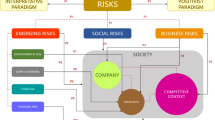Abstract
Enterprises that want to compete in today’s dynamic markets need to be able to respond to the ever-increasing rates of change. At the same time enterprises strive to be ever more sustainable in terms of economic, environmental, societal, and cultural concerns. Enterprises are being challenged at all levels to meet the demands for sustainability and in a manner that can handle the complexity that is present. In this paper we suggest that enterprises need to integrate sustainability objectives with adaptive approaches to manage complexity and uncertainty. The overarching objective of the research is to explore how an enterprise can become both adaptive and sustainable by interweaving the deliberate and emergent in the context of strategy, organization, process, and information. This research seeks to model and develop several artefacts that assist with responses to complexity and uncertainty while also supporting goals of sustainability. In particular, we propose context aware adaptive and sustainable concepts, framework, lifecycle, architecture, and a prototypical implementation.









Similar content being viewed by others
References
Al-Mashari M, Al-Mudimigh A (2003) ERP implementation: lessons from a case study. Information Technology & People 16(1):21–33
Bryan LL, Joyce CI (2007) Better strategy through organizational design. McKinsey Quarterly 07:21–29
Eisenhardt KM, Brown SL (1998) Competing on the edge: strategy as structured chaos. Long Range Plan 31(5):786
Ferguson G, Dakers A, Gunn I (2003) Sustainable wastewater management: a handbook for smaller communities. Ministry for the Environment
Lasher W (2005) Strategic Planning For A Growing Business. Thomson/South-Western
Krajnc D, Glavič P (2005) How to compare companies on relevant dimensions of sustainability. Ecol Econ 55(4):551–563
Marjanovic O (2005) Towards IS supported coordination in emergent business processes. Bus Process Manag J 11(5):476–487
Mintzberg H, Lampel J, Ahlstrand B (2005) Safari: A Guided Tour through the Wilds of Strategic Management. The Free Press
Scheer C H (2007) Jazz Improvisation and Management. Expert Journal
Scott-Morton M (1991) The corporation of the 1990s. Information technology and organizational transformation. Oxford University Press, Oxford
Sen A K (2000) The ends and means of sustainability. Keynote address at the International Conference on Transition to sustainability, Tokyo, May
Sharp A, McDermott P (2001) Workflow modeling: tools for process improvement and application development. Artech House Publishers
Throsby D (1997) Sustainability and culture some theoretical issues. International journal of cultural policy 4(1):7–19
Weick, KE (2012) Making Sense of the Organization. Volume 2, The Impermanent Organization, Wiley.
Author information
Authors and Affiliations
Corresponding author
Rights and permissions
About this article
Cite this article
Peko, G., Dong, CS. & Sundaram, D. Adaptive Sustainable Enterprises. Mobile Netw Appl 19, 608–617 (2014). https://doi.org/10.1007/s11036-014-0525-8
Published:
Issue Date:
DOI: https://doi.org/10.1007/s11036-014-0525-8




